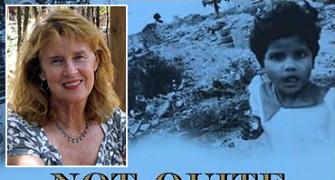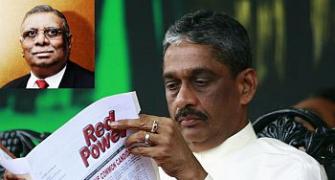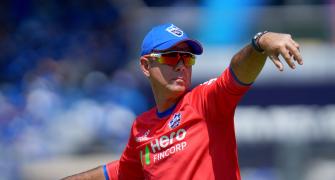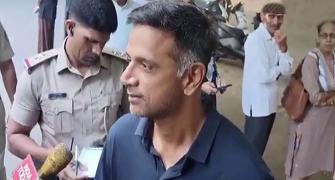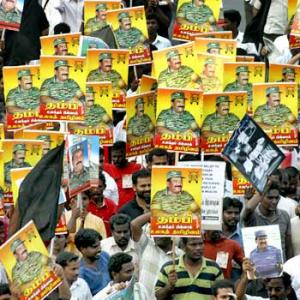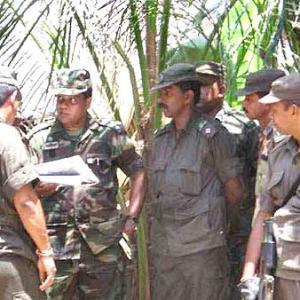The fallout of the spat between two headstrong and powerful personalities like Mahinda Rajapakse and Sarath Fonseka does not augur well for this small and beautiful Island nation struggling to leave the ravages of war behind, writes Nitin Gokhale.
Vellupillai Prabhakaran must be gloating in his grave.
The trinity that plotted his and the Liberation Tigers of Tamil Eelam's downfall has fallen out in less than a year.
Retired General Sarath Fonseka's arrest in Colombo by the military police on Monday night heralds the final chapter in the ongoing clash of egos between the powerful president and his former army chief.
Fonseka is being charged with "military offences", and plotting to kill Sri Lankan President Mahinda Rajapakse and his powerful brothers.
How things change!
Exactly a year ago, in February 2009, President Rajapakse, his tough talking brother, defence secretary Gotabaya and Lt Gen. Sarath Fonseka it seemed, could do no wrong. As a team, the trio had defied international opinion to launch an all out offensive that finally annihilated the LTTE in May 2009.
The Rajapakse brothers and Fonseka rightly took joint credit for what was seen as a rare military victory over an insurgency anywhere in the world.
Now the same officer, who was hailed as an authentic war hero, is facing a court martial on charges of revealing state secrets!
DBS Jayeraj, a seasoned Sri Lanka watcher, writes in his blog: 'General Fonseka widely regarded as the most successful army commander in post-independence Sri Lanka was roughly manhandled, assaulted and forcibly dragged away by military personnel who had saluted him with respect only a few months ago
the ex-army chief, who was the main challenger of President Mahinda Rajapakse in the recently-concluded presidential poll, is currently detained at a chalet within the Naval headquarters precincts in Colombo.'
Other accounts emanating from Colombo also suggest that Fonseka was humiliated and physically dragged by a posse of military policemen led by a major general.
The retired general is apparently being charged on various acts of commission and omission committed during his tenure as army chief. The charges include conspiracy against the commander-in-chief whilst in service, harbouring deserters while in service and indulging in corrupt practices relating to military procurements.
From all available indications, the general is most likely to face an in camera trial under military law.
The general was in the crosshairs of the Rajapakse brothers ever since he broke ranks late last year and quit from his largely ceremonial post of chief of defence staff (CDS).
Fonseka, who almost died in a suicide blast triggered by a female LTTE bomber in the army headquarter in April 2006, was promoted to the post of CDS in less than a week after he led the Army to a military victory over the LTTE.
The speculation at that point was that the President and his brothers felt Fonseka had become too powerful and that the large sections of the military were loyal to the general rather than to the country.
Fonseka was also seen as an authentic war hero by a large section of the majority Sinhala population. As Fonseka's stock rose, so did the mistrust and insecurity about him in the ruling political establishment and especially among the Rajapakse brothers who saw in Fonseka a possible challenger to their popularity. By promoting him overnight as
An insulted Fonseka, therefore, quit as CDS. But the next step was to prove Fonseka's undoing.
It is one thing to be a war hero and quite another to try and translate that popularity into votes, especially if you are up against another 'nationalist' hero like Mahinda Rajapakse. After all, the majority saw Rajapakse as the driving force behind war against the LTTE and the ultimate winner.
Fonseka perhaps overestimated his standing among the people and of course made the mistake of aligning with a largely divided opposition. Predictably, he lost the electoral race.
Rajapakse's overwhelming victory in the presidential race should have been a starting point for a fresh chapter in post-war Sri Lanka where reconciliation on all fronts -- ethnic, political and social -- is absolutely essential.
Instead, by arresting and humiliating Fonseka, the Rajapakses have shown an insecure and vindictive streak in their approach to politics and governance.
The immediate trigger for Fonseka's late night arrest, however, had nothing to do with politics. It was perhaps much more to do with Fonseka's reported willingness to testify in any international probe in human rights violations committed during Eelam War IV, as the final military campaign against the LTTE is more popularly known in Sri Lanka.
The president and the government of Sri Lanka are perhaps afraid that Fonseka would spill the beans about human rights violations committed by the Sri Lankan state in its pursuit of victory against the Tamil Tigers.
Many western nations and human rights organizations have sought an international probe into possible military excesses during the war. So far, Sri Lanka -- with generous support from China, Russia and India -- has successfully thwarted these attempts.
But if an insider like Fonseka was to turn 'rogue' and testify against the Sri Lankan State, it would have meant a lot of trouble for President Rajapakse. It is this possibility that has perhaps prompted Gen Fonseka's arrest under military law. Under the pretext of trying him in a military court, the Sri Lankan State can indefinitely keep Gen Fonseka away from international scrutiny.
Already the United States and the UN have expressed concern.
"There is a tremendous need for the government of Sri Lanka to work to overcome the fissures that exist within its society," State Department spokesman Philip Crowley said in Washington.
"It has to be very cautious that any actions it takes are designed to heal the split within Sri Lankan society, not to exacerbate it," he said.
UN Secretary-General Ban Ki-moon reiterated his appeal to all parties in Sri Lanka and their supporters to show restraint and refrain from violence after the reported arrest of the defeated opposition presidential candidate.
Responding to questions from journalists, a spokesperson for Ban noted that "the peaceful conduct of the first post-conflict national election and its aftermath is of the highest importance for long term peace and reconciliation in Sri Lanka."
That seems to be a fond wish as of now.
Ultimately, the fallout of this spat between two headstrong and powerful personalities like Mahinda Rajapakse and Sarath Fonseka, does not augur well for this small and beautiful Island nation struggling to leave the ravages of war behind.
The author is NDTV's defence & strategic affairs editor. The views expressed here are personal

